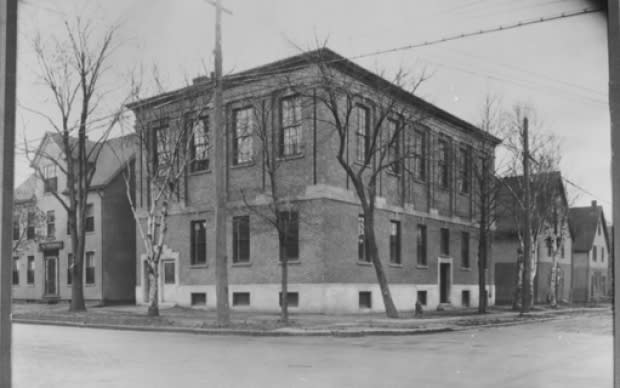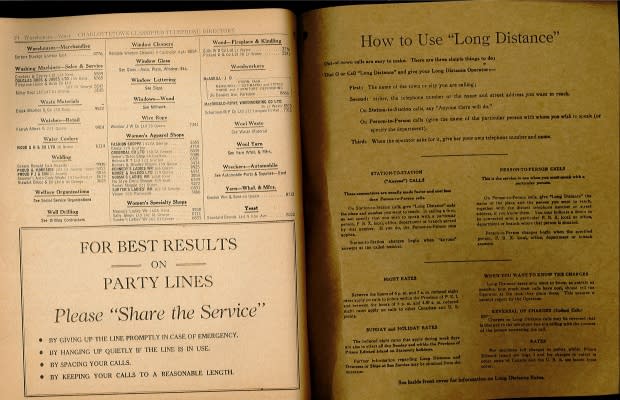Telephones in P.E.I.'s Bygone Days
Reginald "Dutch" Thompson's column The Bygone Days brings you the voices of Island seniors, many of whom are now long-departed. These tales of the way things used to be offer a fascinating glimpse into the past. Every second weekend CBC P.E.I. will bring you one of Dutch's columns.
P.E.I. got its first telephones in 1885, a decade after Alexander Graham Bell invented the revolutionary technology.
Eleven subscribers signed up in Charlottetown at a cost of $30 per year. Two of those telephones were in the Bishop's palace on Great George Street.

As late as 1941, only 22 per cent of homes on Prince Edward Island had a telephone.
Ella Willis was born in 1910 and grew up on a farm in Hampshire, P.E.I.
"I was a teenager before we had a telephone and it was quite an event! We knew what everybody else on the line was doing, everybody listened to everybody else," said Willis.
Tales from the switchboard
In 1930 Eileen Young of Charlottetown, who later married Lester Hickox, landed what was considered a plum job — a switchboard operator at the Island Telephone Company when it was in the same building as Hyndman Insurance Co. In 1932, the phone company built an office building on Queen Street in Charlottetown which is still there today.

"I was there for eight years and a half. It took a couple months to learn the trade, and you didn't get paid while you were learning," she said. She worked with 31 other operators, all female.
Someone told me one time not to lean against the telephone poles cause they'd take me right into Charlottetown! — Mary Sage
Hickox earned $5 a week for several years, working her way up to $8 a week — but only if she worked a double shift on Sunday, she said. She also worked every Christmas Day.
Speaking to the other operators on the board was forbidden, Hickox recalled, and their chairs were lined up in an exact row and were not to be moved.
"Not able to move or talk, it wasn't very comfortable. For $5 a week. That was the discipline."
Depression pay cut
In 1933, during the Great Depression, all Island Telephone employees took a 10 per cent cut in wages. There was not much bargaining power for people like Hickox, who needed that $5 a week to help her mum and dad pay the bills.

Telephone operators did more than plug wires and connect phone lines — you could call the switchboard anytime day or night and get the arrival and departure times of any train or ferry on P.E.I.
"We used to give out the time, and the weather, and all that sort of thing," she said. Every day at 12:30 p.m. the operators would call the exchanges in rural P.E.I. and tell them the weather and time.
"We had a list of emergency calls, there was hospital and fire station and police station news in the country," said Hickox, who said she and other operators were required to memorize dozens of emergency numbers before they were allowed to work the switchboard.

Sharing the party line
Everybody who lived in rural P.E.I. until the 1970s has stories of the party lines — several households shared a phone line, and knew when to pick up their own phone by the length of the phone ring — for example, one short and one long ring.

One Island farmer was bickering over the phone with a cattle dealer, and they couldn't agree on a fair price for the farmer's cattle.
Finally after much back and forth discussion the cattle buyer said "Well, 26 cents a pound is my final offer" and the farmer replied, "I'll think about it."
Out of the blue, a third voice piped up "Better take it Jim, that's the best price you'll get!"
'Who was sick and who died'
In 1929 there were 56 telephone companies on P.E.I. and 55 of them were out in the country, including the North Shore Rural Telephone Company, the Canoe Cove Rural Telephone Company and the Iona Rural Telephone Company.
All those little companies had party lines.

"First telephone I remember was one with the two batteries, B batteries, you opened the little door. Two batteries they hooked up [to a] crank. Once the telephone started ringing, everybody that had a telephone on that line would listen. You'd get all the messages that you needed," remembered Clayton Ballum.
"Some woman said 'I hear you Harry! You're breathing heavy today.' The other said 'No it's not Harry, he went across the fields a while ago.'

"They knew who was sick and who died and who had a baby," Ballum said. He was born in 1916 in Victoria West, P.E.I., and worked as a farm labourer in the 1930s for $5 a month, seven days a week.
Rich Wilson moved from New York City to P.E.I. back in the 1970s, buying an old farm in rural P.E.I., in Iris on the county line between Queens and Kings counties.
People were still on the old party line, with a central switchboard operator. The first time Rich's mother called him she told the American operator she "wanted to call Iris, Prince Edward Island, and the number is Murray River 6, ring 11." The operator replied: "Ma'am, have you been drinking?"
Another time Mrs. Wilson called Rich and the Murray River operator told her to call back later, because Rich wasn't home — he was "out watching a barn fire like everybody else."
Travel through phone lines?
Phones were misunderstood in the bygone days, however.

In 1885 a smallpox epidemic swept through Montreal, and one night a mob marched through the city and surrounded the Bell Telephone Company head office, demanding they shut down the telephone system. People believed the smallpox germs were being transmitted through the telephone wires. The army had to come to rescue those trapped in the telphone office.
Mary Stuart Sage grew up in Wood Islands, P.E.I., where her dad Hector Stuart ran a general store, a sawmill and had a whopping three telephones.
"When I was a child, the telephone poles — there was always a hum. And someone told me one time not to lean against the telephone poles cause they'd take me right into Charlottetown!" laughed Sage.
More P.E.I. news

